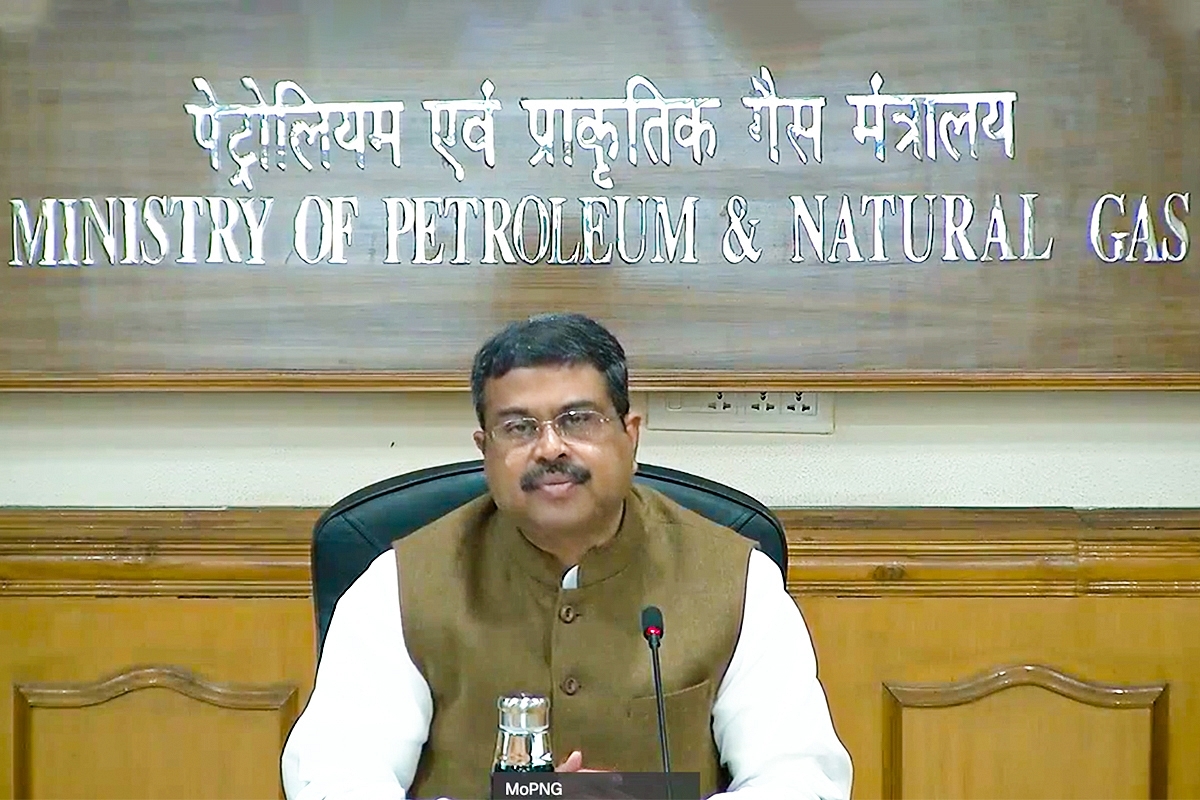Economy
Dharmendra Pradhan Says India's Crude Oil Storage Can Last 74 Days; Government To Launch Second Phase Of Strategic Petroleum Reserve Soon
- The Union Minister for Petroleum, Natural Gas, Oil and Steel also added that the government was keen on providing cleaner fuel and towards this, the Centre wants the share of natural gas in the fuel consumption basket to increase.

Union Minister for Petroleum, Natural Gas, Oil and Steel Dharmendra Pradhan
With India successfully implementing phase one of the strategic petroleum reserve (SPR) policy it now has crude oil storage that can last for 74 days, while it plans to launch the second phase of SPR, Union Minister for Petroleum, Natural Gas, Oil and Steel said today.
“We have successfully implemented SPR phase one and all our caverns have been filled up. We will take forward this experience and launch phase two of SPR,” Pradhan said, responding to questions in the webinar series on 'The Road To Atmanirbhar Bharat' organised by Swarajya in association with Vedanta Resources Limited.
Currently, India has 5.33 million tonnes of crude oil stored and in the second phase it will add a storage space of 6.5 million tonnes, the minister said, adding that the second phase will be a “more commercial and business-friendly model”
He was responding to a question on India's storage situation as compared with the Organisation for Economic Cooperation and Development target of 90 days storage as part of energy security.
India had taken advantage of the slump in crude oil prices to fill its caverns and the drop in prices was a reminder that producing nations had to meet the “expectations and aspirations” of the buyers, he said.
Stating that the crude oil market will be driven by Indian growth, Pradhan said the Indian government is clear that it needs crude oil at a reasonable price.
“We are open to all producers and we want mixed destinations. We are more focussed on alternative fuels and sustainable energy methods,” Pradhan said.
India favoured innovative products such as electric hydrogen, biomass and ethanol, he said.
To a question on crude oil imports quadrupling in the last 20 years, the minister said that the Narendra Modi government believed that more imports (of crude oil) are not good and has fixed targets to reduce import dependency.
Going by International Energy Agency and other reports, growth in crude oil demand will drive global demand, accounting for the one-third of the growth. “India’s per capita crude oil consumption is one-third of global per capital and basic consumption has to grow,” the minister said.
India would attempt to reduce dependence on imports through discovery of small (oil) fields, exploiting more hydrocarbons, providing liberal incentives, though it will still have to depend on imports, Pradhan said.
It would be a matter of strategy for India to import either crude oil or liquefied natural gas (LNG), he said.
“We are keen to develop alternative energy and have made $20 billion capital investments with 1,500 plans under various stages of execution. Meeting demand is not a concern but a challenge. We will choose a de-carbonised pathway,” the minister said.
The government was keen on providing cleaner fuel and towards this, the government wants the share of natural gas in the fuel consumption basket to increase. The share of natural gas in overall fuel consumption was 6.5 per cent until 2014 but steps are being made to make the country more “gas-centric”, he said.
“We have been setting up LNG terminals, trunk pipelines, freeing up marketing, production to provide cleaner fuel. This government is spending $66 billion in gas infrastructure by setting up pipelines in the north-eastern States. We are integrating pipelines from Kutch to Kohima and Kochi to Kashmir,” Pradhan said.
LNG capacity was also being increased from 20 million tonnes to 50 million tonnes and India was importing the gas at competitive price from countries such as Qatar, US, Australia, Russia, he said.
The government has also taken steps for better trade in gas by setting up gas exchange ICEX. “We have also done spot purchases which have been economic and viable during coronavirus times,” he added.
Replying to question on investors' comments on NELP blocks, Pradhan said the total exploration and production acreage under the scheme had increased by an additional 1.65 lakh sq km now from 90,000 in 2014 in view of an open, investment-friendly and transparent policy of the government. “If we have not been transparent, how has so much investment come?” he wondered.
“It is a myth that only big companies can bring in investment. In the shale oil and gas sector in the US, it is small firms that have helped developed the sector,” the minister said, adding that companies such as Total, Shell and Vedanta have invested in India.
Referring to Vedanta, he said it was fast emerging as an exploration and production company. “Even BP is increasing its investment,” he said.
On divestment of government share in Bharat Petroleum Corporation Ltd (BPCL), Pradhan said that three firms had applied for expression of interest in bidding. “The government is committed to offload its shares from state-owned firms to bring in more professionalism (in these companies). It is committed and keen,” he said.
Introducing ElectionsHQ + 50 Ground Reports Project
The 2024 elections might seem easy to guess, but there are some important questions that shouldn't be missed.
Do freebies still sway voters? Do people prioritise infrastructure when voting? How will Punjab vote?
The answers to these questions provide great insights into where we, as a country, are headed in the years to come.
Swarajya is starting a project with an aim to do 50 solid ground stories and a smart commentary service on WhatsApp, a one-of-a-kind. We'd love your support during this election season.
Click below to contribute.
Latest